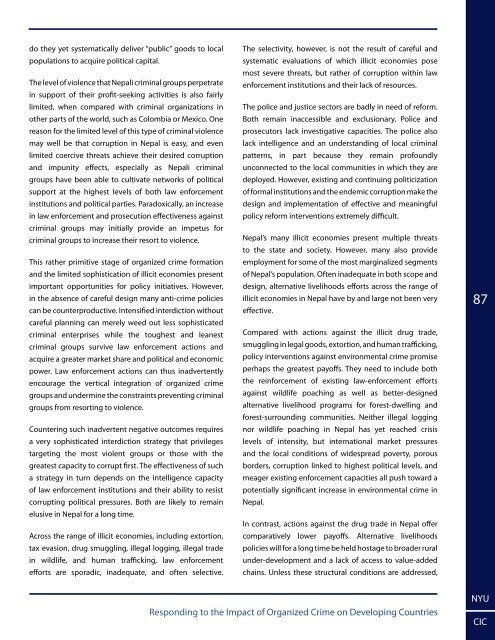here - Center on International Cooperation - New York University
here - Center on International Cooperation - New York University
here - Center on International Cooperation - New York University
Create successful ePaper yourself
Turn your PDF publications into a flip-book with our unique Google optimized e-Paper software.
do they yet systematically deliver “public” goods to local<br />
populati<strong>on</strong>s to acquire political capital.<br />
The level of violence that Nepali criminal groups perpetrate<br />
in support of their profit-seeking activities is also fairly<br />
limited, when compared with criminal organizati<strong>on</strong>s in<br />
other parts of the world, such as Colombia or Mexico. One<br />
reas<strong>on</strong> for the limited level of this type of criminal violence<br />
may well be that corrupti<strong>on</strong> in Nepal is easy, and even<br />
limited coercive threats achieve their desired corrupti<strong>on</strong><br />
and impunity effects, especially as Nepali criminal<br />
groups have been able to cultivate networks of political<br />
support at the highest levels of both law enforcement<br />
instituti<strong>on</strong>s and political parties. Paradoxically, an increase<br />
in law enforcement and prosecuti<strong>on</strong> effectiveness against<br />
criminal groups may initially provide an impetus for<br />
criminal groups to increase their resort to violence.<br />
This rather primitive stage of organized crime formati<strong>on</strong><br />
and the limited sophisticati<strong>on</strong> of illicit ec<strong>on</strong>omies present<br />
important opportunities for policy initiatives. However,<br />
in the absence of careful design many anti-crime policies<br />
can be counterproductive. Intensified interdicti<strong>on</strong> without<br />
careful planning can merely weed out less sophisticated<br />
criminal enterprises while the toughest and leanest<br />
criminal groups survive law enforcement acti<strong>on</strong>s and<br />
acquire a greater market share and political and ec<strong>on</strong>omic<br />
power. Law enforcement acti<strong>on</strong>s can thus inadvertently<br />
encourage the vertical integrati<strong>on</strong> of organized crime<br />
groups and undermine the c<strong>on</strong>straints preventing criminal<br />
groups from resorting to violence.<br />
Countering such inadvertent negative outcomes requires<br />
a very sophisticated interdicti<strong>on</strong> strategy that privileges<br />
targeting the most violent groups or those with the<br />
greatest capacity to corrupt first. The effectiveness of such<br />
a strategy in turn depends <strong>on</strong> the intelligence capacity<br />
of law enforcement instituti<strong>on</strong>s and their ability to resist<br />
corrupting political pressures. Both are likely to remain<br />
elusive in Nepal for a l<strong>on</strong>g time.<br />
Across the range of illicit ec<strong>on</strong>omies, including extorti<strong>on</strong>,<br />
tax evasi<strong>on</strong>, drug smuggling, illegal logging, illegal trade<br />
in wildlife, and human trafficking, law enforcement<br />
efforts are sporadic, inadequate, and often selective.<br />
The selectivity, however, is not the result of careful and<br />
systematic evaluati<strong>on</strong>s of which illicit ec<strong>on</strong>omies pose<br />
most severe threats, but rather of corrupti<strong>on</strong> within law<br />
enforcement instituti<strong>on</strong>s and their lack of resources.<br />
The police and justice sectors are badly in need of reform.<br />
Both remain inaccessible and exclusi<strong>on</strong>ary. Police and<br />
prosecutors lack investigative capacities. The police also<br />
lack intelligence and an understanding of local criminal<br />
patterns, in part because they remain profoundly<br />
unc<strong>on</strong>nected to the local communities in which they are<br />
deployed. However, existing and c<strong>on</strong>tinuing politicizati<strong>on</strong><br />
of formal instituti<strong>on</strong>s and the endemic corrupti<strong>on</strong> make the<br />
design and implementati<strong>on</strong> of effective and meaningful<br />
policy reform interventi<strong>on</strong>s extremely difficult.<br />
Nepal’s many illicit ec<strong>on</strong>omies present multiple threats<br />
to the state and society. However, many also provide<br />
employment for some of the most marginalized segments<br />
of Nepal’s populati<strong>on</strong>. Often inadequate in both scope and<br />
design, alternative livelihoods efforts across the range of<br />
illicit ec<strong>on</strong>omies in Nepal have by and large not been very<br />
effective.<br />
Compared with acti<strong>on</strong>s against the illicit drug trade,<br />
smuggling in legal goods, extorti<strong>on</strong>, and human trafficking,<br />
policy interventi<strong>on</strong>s against envir<strong>on</strong>mental crime promise<br />
perhaps the greatest payoffs. They need to include both<br />
the reinforcement of existing law-enforcement efforts<br />
against wildlife poaching as well as better-designed<br />
alternative livelihood programs for forest-dwelling and<br />
forest-surrounding communities. Neither illegal logging<br />
nor wildlife poaching in Nepal has yet reached crisis<br />
levels of intensity, but internati<strong>on</strong>al market pressures<br />
and the local c<strong>on</strong>diti<strong>on</strong>s of widespread poverty, porous<br />
borders, corrupti<strong>on</strong> linked to highest political levels, and<br />
meager existing enforcement capacities all push toward a<br />
potentially significant increase in envir<strong>on</strong>mental crime in<br />
Nepal.<br />
In c<strong>on</strong>trast, acti<strong>on</strong>s against the drug trade in Nepal offer<br />
comparatively lower payoffs. Alternative livelihoods<br />
policies will for a l<strong>on</strong>g time be held hostage to broader rural<br />
under-development and a lack of access to value-added<br />
chains. Unless these structural c<strong>on</strong>diti<strong>on</strong>s are addressed,<br />
87<br />
Resp<strong>on</strong>ding to the Impact of Organized Crime <strong>on</strong> Developing Countries<br />
NYU<br />
CIC
















